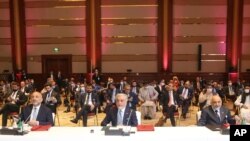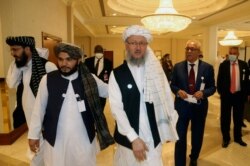Abdullah Abdullah, the head of Afghanistan’s peacemaking High Council for National Reconciliation, has begun a three-day official visit to Pakistan.
Abdullah is undertaking his first visit to the neighboring country in more than a decade amid peace negotiations between representatives of the Afghan government and Taliban insurgents underway in Qatar.
Officials in Islamabad said that in meetings between Abdullah and Prime Minister Imran Khan as well as other top Pakistani leaders, the two sides will discuss matters related to the U.S.-brokered intra-Afghan dialogue and strengthening of bilateral relations.
The ongoing talks between the Afghan warring factions, which commenced earlier this month in Qatar’s capital of Doha, are a product of the February 29 agreement the United States signed with the Taliban to close the war in Afghanistan.
President Donald Trump’s administration credits Pakistan, known for maintaining close contacts with the Taliban, for encouraging the insurgents to negotiate the deal to help the U.S. extricate its troops from America’s longest conflict.
“Pakistan is deeply gratified that it has fulfilled its part of the responsibility,” Khan said Friday while addressing the United Nations General Assembly.
He stressed the need for Afghan leaders to seize the “historic opportunity” to achieve reconciliation and restore peace in their war-torn country.
“Peace and stability in Afghanistan will open new opportunities for development and regional connectivity,” the Pakistani leader said.
Pakistan’s links to the Taliban have been a primary source of political tensions with Afghanistan. The two countries share a nearly 2,600-kilometer border, and each accuses the other of sheltering militants involved in subversive acts on their respective territories.
Landlocked Afghanistan has for decades relied mostly on Pakistani overland routes and seaports for bilateral as well as international trade. Mutual tensions, however, have significantly undermined bilateral trade activities in recent years.
"The visit of Dr. Abdullah Abdullah will contribute to further strengthening amity, brotherhood and close cooperation between the two countries,” a Pakistani foreign ministry statement said Sunday.
Last week, Abdullah told a Washington-based think tank that the way forward for Kabul and Islamabad is to cooperate closely to deny terrorist groups a foothold in the region in favor of economic development.
“There is a lot of mistrust, founded or unfounded. We need to address those things, and in a sort of forward-looking ways. There are lots of grievances on both sides,” the chief Afghan peacemaker told the Council on Foreign Relations.





